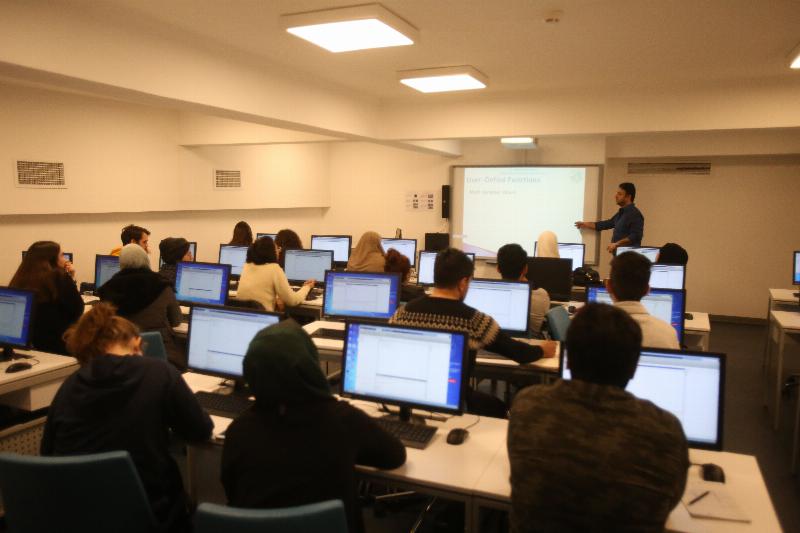Computer Engineering Master’s Department (English) – About
Given the advancing technology, developments in fields such as artificial intelligence, robotics, brain computer interface studies, bioinformatics and data mining, increase the need for Computer Engineer experts with theoretical and practical knowledge.
What is Computer Engineering Master’s Program (English)?
In today’s world, the fact is that information and technology is a part of our lives. The interdisciplinary studies gain importance all over the world has caused the importance of studies in computer engineering to increase rapidly. Developments in software development methods, hardware technologies, health informatics, robotics, artificial intelligence technologies, neuroscience and data mining speed up the developments in computer engineering.
Therefore, specialized computer engineers who are able to follow the English literature are needed in every sector of technology and informatics. The aim of Computer Engineering (English) with Thesis / Non-Thesis to educate researchers who have the theoretical and practical knowledge related to the field, have the ability to follow the English resources and developments in the field simultaneously with the rest of the world, are equipped in designing, to develop and ensure the security of information systems, to have advanced problem solving skills and to be focused on the application.
Who can apply?
Graduates of the Faculty of Engineering, Mathematics and Computer Science, Statistics, Physics, Chemistry, Biology, Astronomy and Space Sciences and similar Science-Mathematics Science and Teaching Undergraduate Programs graduates can apply. Candidates who have received their undergraduate degree in a different field from Computer Engineering and Software Engineering will participate in the Scientific Preparation Program to be determined by the Department of Computer Engineering and the Board of Directors of the Graduate School. The Scientific Preparation Program should be completed in maximum 2 semesters.
What are the application requirements?
In the 2021-2022 Fall Semester, there will be no science exams in Thesis/Non-Thesis programs;In our thesis programs, 65% of the ALES in the relevant score type, 35% of the undergraduate graduation grade point average,In non-thesis programs, 50% of the undergraduate graduation grade and 50% of the relevant score type ALES, if any, will be taken.If the candidates applying to non-thesis programs do not have ALES scores, 55 points will be accepted and ranking will be made.There are 15 student quotas for the Thesis Program and 30 students for the Non-Thesis Program.
English proficiency certificate is required for graduate programs in English. For programs conducted in English or another foreign language, the foreign language proficiency level and other criteria suggested by the relevant Graduate School Executive Board and approved by the Senate are announced to the candidates. Prospective students can meet the English entrance requirement by taking TOEFL IBT, YDS, e-YDS or the English Proficiency Exam organized by Üsküdar University during certain periods of the year.
What are the compulsory and elective courses?
The number of courses to be taken in the Scientific Preparatory Program is 6 and the total number of credits is 18. Master's program with Thesis consists of at least 7 courses, 1 seminar course and thesis study, which corresponds to a total of 21 credits. Seminar course and thesis work are non-credit and considered as successful or unsuccessful. The master's program with thesis consists of at least 8 courses including a seminar course and a minimum of 120 ECTS credits, including a minimum of 60 ECTS credits per semester. Up to two of the courses that the student will take can be selected from undergraduate courses provided that they are not taken during undergraduate education.
In the Non-Thesis Master's program, there are at least 10 courses with a total of 30 credits and not less than 60 ECTS. The student is obliged to register for the term project course and submit a written project and / or report at the end of the semester. The term project course is non-credit and the evaluation is done as successful or unsuccessful. A maximum of three courses can be selected from undergraduate courses provided that they are not taken during undergraduate studies.
What courses are taken in Computer Engineering Master’s Program?
In order to closely follow and direct the rapidly developing information technologies, the Computer Engineering Master's program offers compulsory courses for students to learn the basic information and elective courses related to the field they want to study. These courses include data communication and computer networks, algorithms, data and network security, artificial intelligence and applications, digital image processing, cryptography, cyber security, software engineering, computer image processing, bioinformatics, brain computer interfaces, robotics and mobile application development.
What are the occupational areas of Computer Engineering Master’s Program Graduates?
Computer Engineering graduates have a wide range of occupational areas. These include health institutions or organizations, defense industry, state banks and private banks, various ministries and their affiliated units, retail sector, transportation sector, aviation sector, universities, especially the entire education sector, press organizations, multimedia, computer games and application development organizations. Language of instruction is English. The fact that the language of instruction is English makes it easier for graduates to find jobs in international fields and provides competence in writing and reading academic publications. In summary, there are job opportunities in public and private sectors in every field that need for computer engineering is increasing rapidly.










